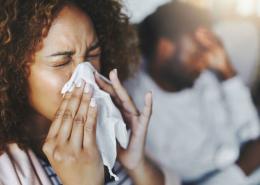Celebrating World Patient Safety Day

World Patient Safety Day recognizes patient safety as a global health priority, a priority that Pfizer is committed to through its global health initiatives. Established in 2019 by the World Health Organization (WHO) and celebrated annually on September 17th1, the focus of this day is to bring together the global community of patients, families, caregivers, health workers, health care leaders, and policymakers to improve patient safety.
“Patient safety is absolutely critical. It is the foundation for everything Pfizer is doing,” said Patrick Caubel, M.D., Chief Safety Officer at Pfizer and a renowned leader in clinical pharmacology and pharmacovigilance. “For over 130 years, taking care of patients and their well-being has been at the core of what we do every day.”
The theme for 2020 is “Health Worker Safety: A Priority for Patient Safety,”3 linking health worker safety with patient safety. As the COVID-19 pandemic has shown, without a safe working environment for health workers, their lives and patients’ lives are at risk.
We spoke with Caubel to learn about the importance of this day and how Pfizer supports this commitment to making health care safer for everyone across the globe.
Why is World Patient Safety Day so important and how has it taken on a new significance during the COVID-19 pandemic?
It was a very good initiative from the WHO to start World Patient Safety Day. Patient safety is not limited to drug safety—it’s different depending on where patients live and the kind of healthcare they have access to. For instance, in developing countries, the lack of appropriate equipment, medication, and even the inappropriate use of drugs causes many hospitalizations and deaths each year.
Because the quality of patient care varies across regions, it’s important for patient safety to be identified and recognized at the global level. In the face of the COVID-19 pandemic, focusing on patient safety resonates now more than ever, as we work to develop a vaccine that is safe and effective.
Why is this year’s theme—Health Worker Safety—so important?
COVID-19 has made it clear that patient safety is inextricably linked with health care worker safety. In the first few months of the pandemic, a lot of health care workers got sick and died from COVID-19 due to a lack of appropriate equipment and protective gear—glasses, gloves, masks. Health care workers are a very important group of people to protect. Not only are they risking their lives to save others -- if we don’t have adequate medical personnel, then there’s nobody available to care for patients.
How has Pfizer supported health workers during COVID-19?
At the start of the pandemic, Pfizer launched our Coronavirus Medical Service Program, to support health systems around the world that were being stretched to the breaking point. In the spring, as a number of health care workers came down with this illness, we saw a unique opportunity for our colleagues to support the medical community in crisis. Through this service program, colleagues who felt called to volunteer their medical skills went into their local communities to diagnose, treat and provide public health support for patients with COVID-19.
Simultaneously, Pfizer and the Pfizer Foundation committed $40 million in medical and charitable cash grants to help combat the global health effects of the COVID-19 pandemic. The donation addressed the urgent needs of partners who are working to slow the spread of the virus within communities, strengthen vulnerable healthcare systems, and help medical centers, hospitals and clinics improve the management and outcomes of patients with COVID-19.
Pfizer’s CEO, along with eight other vaccine manufacturers’ CEOs, recently signed a historic pledge to continue to prioritize the safety and well-being of vaccinated individuals in developing a COVID-19 vaccine. What does that mean for Pfizer’s Worldwide Safety organization?
We are committed to making sure that our resources are dedicated to the discovery, testing, evaluation, and manufacturing of a potential vaccine for COVID-19. The pharmaceutical companies that are involved in COVID-19 vaccine development have been aligned on the same goals from the beginning: apply the best, fair, unbiased medical judgment to the safety of all subjects. This includes public disclosure and applying transparency and fairness to safety evaluation. If people don't trust that the product has been shown to be safe and efficacious, they are less likely to be vaccinated.
The speed at which everybody came together and mobilized—the government, drug industry, and vaccine manufacturers—this is absolutely historic.
You have built your career at Pfizer in Safety Surveillance and Pharmacovigilance, and you were recently named the Chief Safety Officer. What does patient safety mean to you personally?
I’m an OB-GYN by training and also a clinical pharmacologist. After practicing for almost 20 years, I decided to move full-time into drug development and pharmaceutical research. Very quickly I realized that being able to protect patients, to investigate the products that we were developing, was absolutely critical.
For me, taking care of patient safety is the same as if I were personally delivering care to patients. You’re protecting patients who are not your patients, but they’re still patients taking your products. Safety is the most important thing for us to deliver at the end of our research. We have to make sure that we have the safest delivery of care to each and every patient.
To learn more about World Patient Safety Day, click here.
--
Resources:
- who.int. World Patient Safety Day, World Health Organization. Available at: https://www.who.int/patientsafety/world-patient-safety-day/en/#:~:text=The%20Seventy%2Dsecond%20World%20Health,observed%20annually%20on%2017%20September. Accessed September 11, 2020.
- pfizer.com. The Journey. Available at: https://www.pfizer.com/people/history. Accessed September 14, 2020.
- who.int. World Patient Safety Day, World Health Organization. Available at: https://www.who.int/patientsafety/world-patient-safety-day/en/#:~:text=The%20Seventy%2Dsecond%20World%20Health,observed%20annually%20on%2017%20September. Accessed September 11, 2020.
![]()





